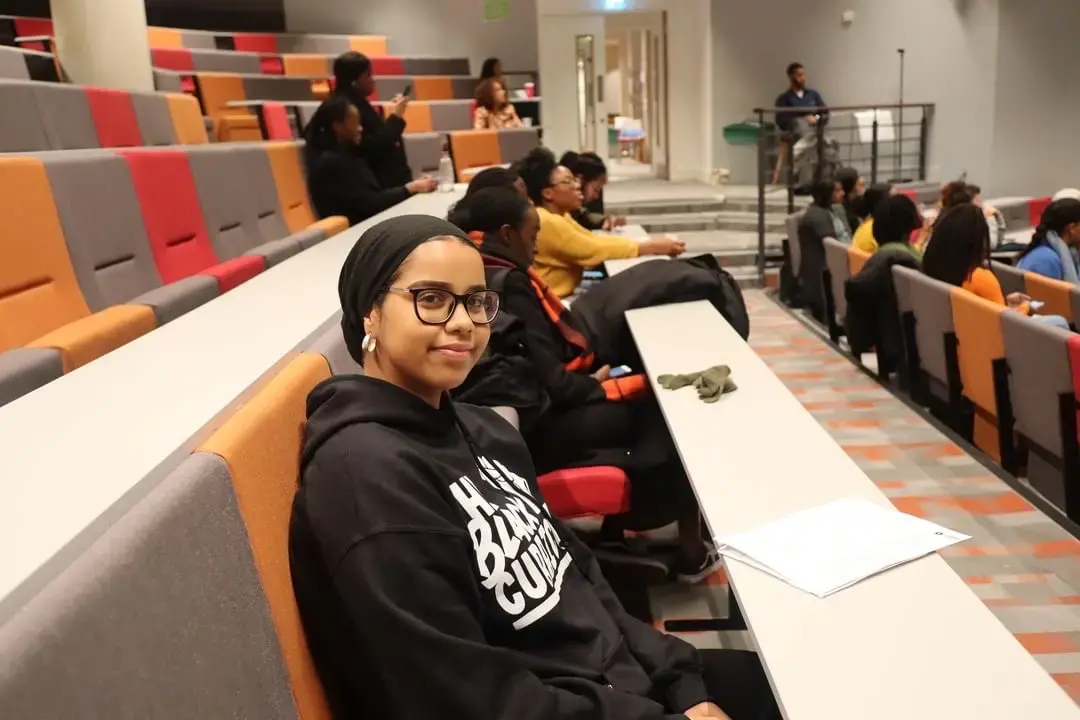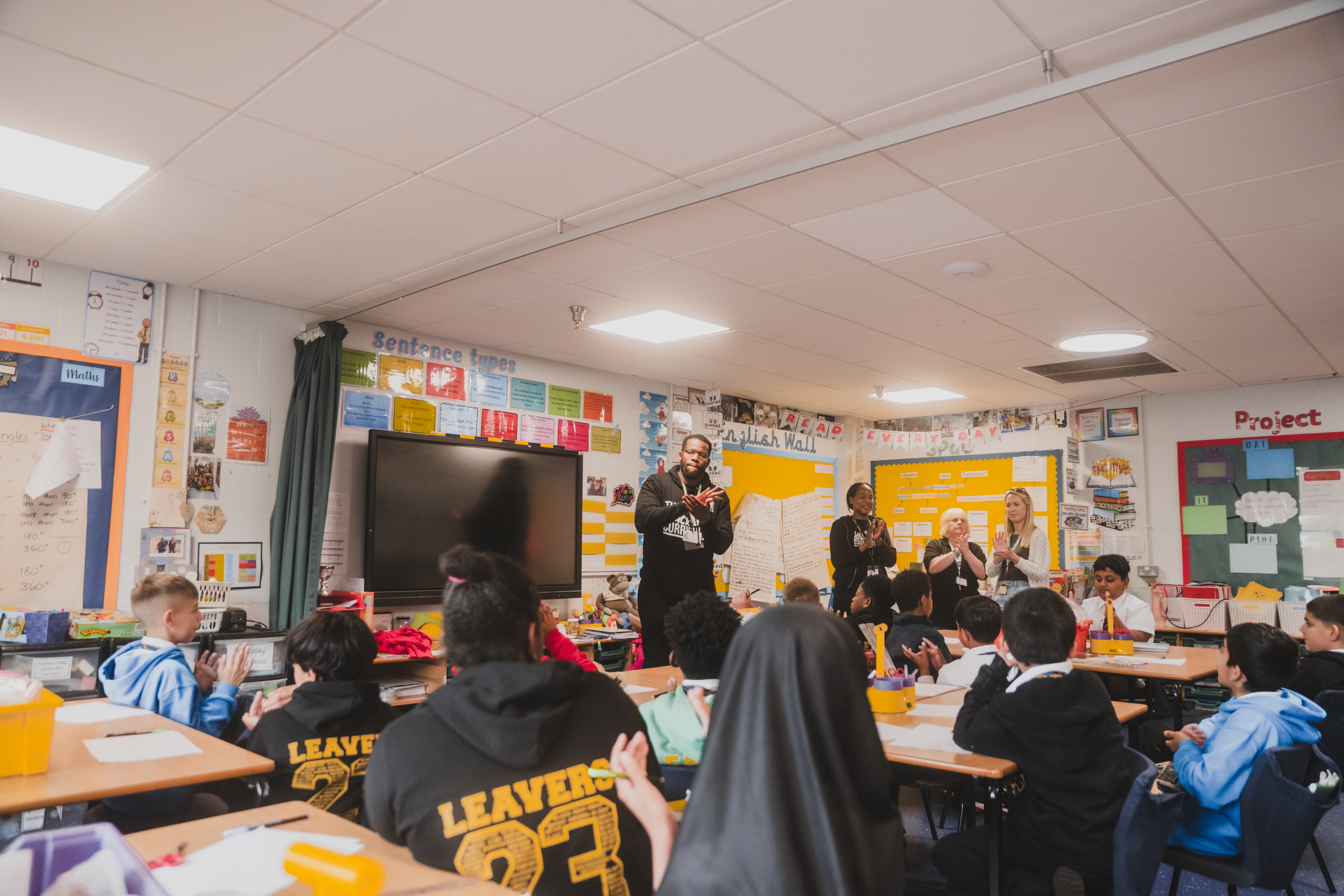
The Black Curriculum stands as a beacon of change.
When Ilhan Rayen Awed started college in North London, England, she was excited about the educational possibilities.
"I was always interested in global narratives and what's going on in the world,” Awed said about her younger self’s desire to study the complexities of African, Middle Eastern, and Asian history.
But she was disappointed, she said, by the curriculum's heavy emphasis on European history and its seemingly repetitive focus on topics like World War II.
“My sister was a big part of me expanding my knowledge,” Awed said. “She informed me that the uni she was attending at the time only taught African, Middle East, and Asian history. There is no European history. And I went, 'What?'”
The lack of representation of African, Middle Eastern, and Asian history in her educational journey left Ahwed feeling bored, she said, and prompted her to embark on a personal quest for knowledge.

As a nonprofit journalism organization, we depend on your support to fund more than 170 reporting projects every year on critical global and local issues. Donate any amount today to become a Pulitzer Center Champion and receive exclusive benefits!
This quest led Awed to join forces with Lavinya Stennett, the founder of The Black Curriculum in the U.K., an organization committed to addressing the lack of Black British history in the nation’s curriculum.
"It's the affirmation of our young people, right?” Elizabeth Kwaw, head of evaluation and research at The Black Curriculum, said about the importance of teaching Black history in U.K. schools. “They can be anything they want to be. [There's] the pride, the confidence, the self-esteem, but then also the empathy that they build, understanding other people's stories and having a sense of belonging."
Stennett founded The Black Curriculum in 2019 after having an experience she said was similar to Awed’s. Marked by an endless commitment to justice, Stennett quickly gained the support of Bethany Thompson and Lisa Kennedy, forging a team determined to unravel the hidden chapters of Black history in the U.K. curriculum.
At its core, The Black Curriculum has a mission that resounds with urgency: #TBH365, or teaching Black history 365 days a year. Its programs, tailored for young people aged 3 to 25, aim to instill a sense of identity and provide the tools needed to navigate the diverse world. The ultimate goal is to bring awareness to Black history within the English national curriculum, presenting a thorough picture of Black British history, including real-life examples from various periods in history dating back hundreds of years.
This mission received unprecedented support in the wake of the 2020 wave of racial reckoning. George Floyd's murder in the United States in May 2020 triggered a global outcry against systemic racism, and the Black Lives Matter (BLM) movement gained significant momentum.
At the time, Stennett and The Black Curriculum team were already on a mission to bridge educational gaps. But the surge in support for BLM propelled their work into the international spotlight, a journey that is demonstrated by the organization’s Instagram following, which increased more than 60% within a month of Floyd's death. The Black Curriculum had 1,500 followers on Instagram in May 2020. By the end of June 2020, the organization's Instagram following had surged to 140,000 followers.
The Curriculum
The organization's curriculum addresses vital subjects, such as the trans-Atlantic slave trade, movements to abolish slavery, and the Windrush Generation.
Named after the ship HMT Empire Windrush, the Windrush Generation of Caribbean immigrants who came to the U.K. between 1948 and 1971 faced immense challenges upon arriving in the country after World War II. They confronted racism, housing discrimination, and limited job opportunities, but persevered to build better lives.
The Windrush Generation was faced with "No Blacks, No Irish, No Dogs" signs and a "hostile environment" policy, introduced between 2010 and 2019, that made life difficult for undocumented migrants, affecting some of the Windrush Generation who faced deportation threats.
The Windrush Scandal of 2018 revealed the unfair treatment and service denials toward legitimate members of the Windrush Generation because of changes in immigration policies. After this, then-Home Secretary Amber Rudd issued a public apology and pledged to rectify the situation.
Glenda Caesar, who has been living in the U.K. for more than 50 years, said she lost her National Health Service (NHS) job as a doctor’s practice administrator because she did not have a British passport. “Rudd’s apology meant nothing because it’s something that shouldn’t have happened in the first place; they’re apologizing but we are still suffering,” Caesar said.
Today, The Black Curriculum aims to use stories like this to ensure Black history is not just taught, but also celebrated, empowering youth to connect with their cultural heritage.
The Black Curriculum has recently moved into its first permanent office space and is expanding its Young Champions forum, set to launch in 2024. The #TBH365 campaign is progressing, aiming to challenge white supremacy.
Kwaw is preparing a report on the evolution of the organization's impact. She recently consulted with education practitioners about history programs in the national curriculum and the government's proposed Model History Curriculum.
Francesca Ainslie, an educator from The Black Curriculum's Learning and Development team, is creating workshops for primary and secondary school students. These workshops will cover a range of topics, including educational resistance, key individuals such as Jamaican-born activist Olive Morris, music and migration, sound system culture, and protest poetry. The team is also rolling out a new Teacher Training offer, starting with the foundation course titled "Equity in Education."
Awed, the project lead, is involved in auditing and consulting on projects with museums and heritage institutions. Additionally, she is reviewing history resources for various education and corporate partners and engaging in discussions with multiple organizations to explore potential collaborations.
Looking ahead, The Black Curriculum is gearing up to launch its Level One training course in January. This course will include modules on identity, intersectionality, and culture; evolution of language; and embedding Black British history. Teacher training sessions are planned for London and Manchester.
These team members each bring their unique perspective and expertise, exemplifying the collective dedication that fuels The Black Curriculum's mission.
As Stennett said, “Our work is not just to teach for the sake of teaching; it's to actually remodel society.”








